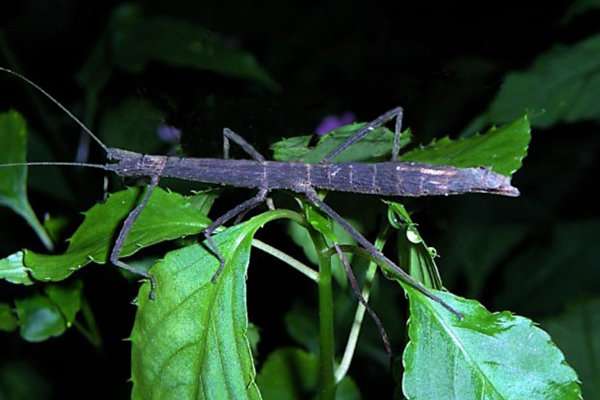Stick bugs alter decomposition rates by modifying litter bacteria

Bugs the size of tiny twigs have a large impact on the rainforest, according to a new study led by University of Dayton researcher Chelse Prather and published in the current issue of the prominent journal Ecology.
"The importance of small insects, especially things that eat plants in rainforest like the walking stick, has been virtually ignored," said Prather, assistant professor of biology. "These insects are diverse and abundant but many are going extinct quickly, so showing they can have a big effect on how the rainforest functions is important. If something causes declines in their populations, we risk potentially altering how these rainforests function."
Prather's three-year experiment, funded by the National Science Foundation, found walking sticks—herbivores which live in plants above the "litter," or layer of dead leaves, branches and other materials on the rainforest floor—affect decomposition through their diet choices.
"Walking sticks have preferences in food, just like we do," Prather said. "You'd probably rather eat spinach than a corn husk because the corn husk is going to be hard to chew and hard for your body to break down."
The walking sticks eat the more easily digestible spinach-like leaves and ignore the less digestible plants, which are also slower to decompose when they die and fall to the ground. That change in the makeup of the dead leaves on the forest floor affected the composition of the bacteria that decompose the litter. There was less bacteria and fewer types of them.
Prather's group, which worked in Puerto Rico, also examined snails that live in litter, but surprisingly found the snails actually living on the forest floor did not affect decomposition. The findings are important, Prather said, because ecologists previously ignored insects living above the layer of dead leaves in the forest.
"What we're showing is that something that doesn't live in the litter can actually have huge effects, and maybe effects that are greater than things that live in litter, because they're actually altering the litter itself. If it is more widespread in other forests, it could be really important," she said. "This is one of the first studies to say insects that feed on plants could be really important to the way these rainforest systems function. It highlights the fact that it needs to be much better studied because up until this point, it's been ignored."
The study also examined if light gaps that are caused by things like treefalls due to high winds from tropical storms and hurricanes changed these animals' effects on decomposition, but found no effect in the areas with complete canopy cover versus those whose canopy was gone.
Prather says that this may just be due to how the experiment was conducted, and that in reality, a storm could enhance the effects of the walking sticks.
"These storms often increase the amount of easily digestible plants, allowing walking sticks to reproduce more quickly," she said. "If the walking sticks eat more, they could perhaps slow down decomposition even more in the months following a big storm."
More information: Chelse M. Prather et al. Tropical herbivorous phasmids, but not litter snails, alter decomposition rates by modifying litter bacteria, Ecology (2018). DOI: 10.1002/ecy.2169
Journal information: Ecology
Provided by University of Dayton



















